News release October 1, 1999. The 2000 fiscal budget presented to the Althingi.
The fiscal budget for the year 2000, which is being presented to the Althingi today, signals great restraint in economic policy in accordance with the Government's policy to offset the expansion in the economy and ensure continued stability. The budget projects a doubling of the revenue surplus from this year, which will most likely be the largest surplus in history. There is no doubt that the Government will thereby do much to counter the expansion in the economy and thus mitigate excess demand pressures that presently are in evidence. The substantial net financial surplus makes it possible to reduce government debt on an unprecedented scale. Such a measure will ease the credit market and reduce Treasury interest payments in the long run.
A 15 billion Treasury surplus.
The 2000 fiscal budget is presented with a larger revenue surplus than has been known in this country for many years, whether measured in absolute amounts or in relation to GDP. The revenue surplus of the Treasury is projected at 15 billion krónur in the 2000 budget, equivalent to an estimated 2.2 per cent of GDP. By comparison, the 1999 budget was passed with a 2.4 billion surplus, whereas the latest estimate puts the surplus at 7S billion or 1.2 per cent of GDP.
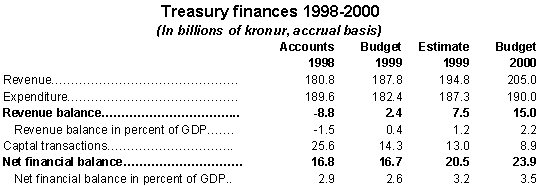
A 60 billion net financial surplus over three years.
The net financial balance shows the surplus available to the Treasury for reduction of debt and is therefore the most important measurement of the impact of fiscal finances on the economy. The net financial surplus in 2000 is expected to exceed the revenue balance and amount to nearly 24 billion krónur, compared with an estimate of 20 billion for 1999 and 17 billion in 1998. The net financial surplus in 1998-2000 would thus total more than 60 billion krónur.
Net Financial Balance of the Treasury
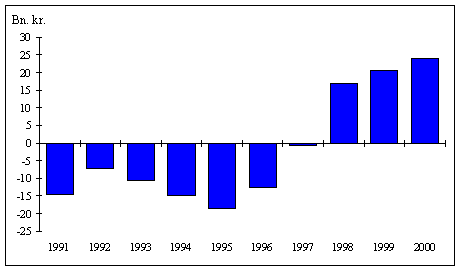
Government borrowing will decline.
Due to the strength in Treasury finances, new borrowing will sharply decline. The Treasury borrowed 28 billion krónur in 1998 of which 20 billion was borrowed at home. Repayments amounted to 37 billion in that year. Borrowing in 1999 is estimated to amount to 18.5 billion and repayments to 35 billion. New borrowing is projected at 5 billion in 2000 and repayments are scheduled at 27 billion.
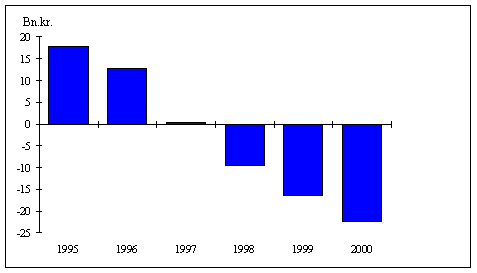
Debt is being considerably reduced.
The substantial financial surplus of the Treasury makes it possible to reduce Treasury debt as well as interest and amortization payments for the next several years. Deliberate steps have been taken in recent years to improve government management and Treasury finances with the result that Treasury debt has been reduced by more than one-fifth from 1995 to the end of 1998, a sharp shift from earlier years of persistent deficits and debt accumulation. There is further prospect for debt reduction this year and next. According to the 2000 fiscal budget, Treasury debt is estimated to equal about 30 per cent of GDP at the end of 2000 as against 51 per cent at the end of 1995.
Gross Treasury Debt
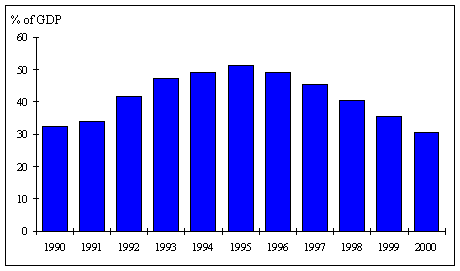
A slower rise in Treasury revenue.
Considerable changes in economic developments must be expected next year. Economic growth is expected to be less and Treasury revenue will therefore rise by less than at present. Total Treasury revenue is estimated at 205 billion krónur in 2000, an increase of 10 billion over the estimate for this year. Of this increase, 2S billion is expected to come from personal income taxes, 1 billion from social security taxes and close to 5 billion from indirect taxes. Treasury revenue in per cent of GDP is expected to decline from 30.3 per cent in 1999 to 29.8 per cent in 2000.
Treasury expenditure will decline in real terms.
Total Treasury expenditure is estimated at 190 billion krónur in 2000, rising by 2.7 billion from the 1999 estimate. Excluding pension commitments, expenditure rises by 4 billion krónur, about 2.3 per cent. Total expenditure would thus decline by 1.5 per cent in real terms from the estimate for this year, based on present price expectations. In per cent of GDP, expenditure is estimated to decline by 1S percentage points, from 29.2 to 27.7 per cent.
Pension expenditure commitments are declining.
The estimated pension commitments that must be entered as expenditure are expected to amount to about one-third of what they were in the 1998 accounts, or 6.6 billion krónur, which is 1.3 billion less than in the 1999 budget.
Government investment projects will be postponed.
The fiscal budget presents a reduction in government investment of 2 billion krónur from the present year in order to mitigate the expansion in the economy. Several large investment areas, such as the construction of government buildings and roadbuilding, have been curtailed. Treasury appropriations for investment are expected to be cut by 14 per cent from the present year and total public investment, i.e., by the central government, municipalities and public entities, should decline by 8 per cent. The Government is thus doing its part to ensure continued stability.
Interest payments will deline sharply.
The determined reduction in Treasury debt in recent years has led to a reduction in interest payments of the Treasury by 2 billion krónur since 1998.
Treasury Interest Payments
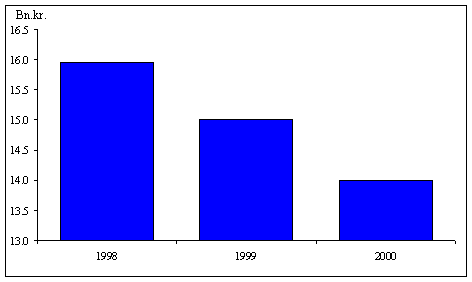
Increased expenditures for education and welfare.
The main emphasis on the expenditure side of the budget is on education, health and welfare. On the education side, appropriations for higher education are increased as well as for rehabilitation centers for young persons with behavioral or drug problems. Increased health and welfare expenditures go to hospitals, nursing homes and community homes for the handicapped.
Sales of government assets will continue.
In accordance with the Government's Policy Declaration (for full text), sales of government assets are continuing. The budget assumes that profits from government asset sales will amount to 4 billion krónur in the year 2000. These profits will exclusively be used to reduce government debt and will not be applied to current expenditures. The choice of assets put up for sale has not yet been decided upon, but it is apparent that some of the assets under discussion are highly valued by the market and the Treasury thus has a number of attractive alternatives to choose from.
Stronger performance criteria called for.
The fiscal budget places emphasis on better performance criteria for the operations of the government and its agencies. Government managers will be increasingly responsible for staying within their budget limits so as to reduce the need for supplementary appropriations. The room for maneuver of government managers will be increased and their responsibility for the performance of agencies under their management will increase at the same time. Individual ministries will continue their work of reviewing their operations with a view towards improving service, lowering costs and increasing efficiency.
Developments in the Icelandic economy have been most favorable in recent years. The rate of economic growth has exceeded that of neighboring countries, unemployment is declining and is currently amongst the lowest in industrial countries. Investment is rising, the current account deficit is declining and purchasing power keeps increasing. Inflation has been contained, although some demand expansion has been in evidence in recent months. In order to keep inflation and the current account deficit in check, the fiscal budget must be run with a substantial surplus. That is the principal goal of the fiscal budget.
